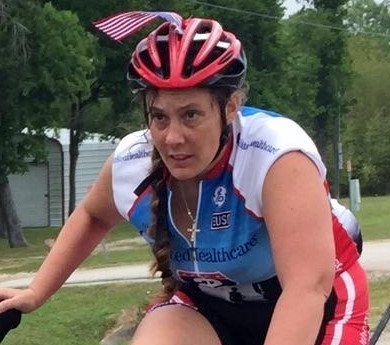
A right knee devoid of cartilage. A left knee and hip riddled with arthritic degeneration. A lower back that throbs with pain. These are not the wounds of a retired NFL or NBA player. They’re the daily reminders of a soldier’s life while she tries to regain a sense of calm after being deployed to Afghanistan and suffering an injury (non-combat) that challenged her ability to cope.
“I can’t run anymore, and I used to love doing road races. So I took up biking and it changed my life — making me more physically and emotionally sound; I’ve lost weight and gotten healthier,” explains Sgt. Audra Edelen, who learned about Ride2Recovery at Fort Sam Houston, where she was a platoon sergeant.
Audra is like so many other returning veterans, whose physical and emotional scars of war have left them very different from the person they were upon deployment. The result in many cases is a dependency on various medications to help pick up the pieces and regain the sense of normalcy they crave. However, exercise — and Ride2Recovery more specifically — became an incredibly important part of Audra’s personal journey, and noticeably lessened her need for pills.
“I didn’t know about Ride2Recovery until I went to Ft. Sam Houston, and it has totally changed my life,” she says, barely able to contain her passion and enthusiasm. “I’m physically, emotionally and mentally much stronger, and my depression has pretty much gone away, so I’m not on many medications anymore; I only take them when I need them. Now the only thing I take is pain medication.”
It’s one thing to feel relief and satisfaction for personal achievements along the path to recovery, but in Audra’s case, leading others to meet and exceed their goals is more rewarding, not to mention a testament to her team-first attitude.
“I try to help out as much as possible. I’m one of the ‘pushers,’ so I help with the hand cycles to get them through those hills and miles,” says Audra. “I make sure everyone gets to the finish, because we’re all in this together — one mile at a time, one pedal stroke at a time — so I do a lot of coaching and motivation. I really don’t think about my injuries when I’m helping others; we’re all just trying to get over the next hill together and on to the next mile” she explains.
Audra hopes her sense of “we” over “me” can go a long way toward getting more veterans to participate in Ride2Recovery. It’s a big challenge to get people to join a group when they’re dealing with so much anguish and hopelessness. Her message to those people? “You’re not alone, so don’t keep it inside, because that’s the worst thing you can do. If you get around other vets, you at least have an opportunity to talk to people with similar experiences and who can relate to each other. It may not be the exact same experiences or the exact same injuries, but you can at least relate to one another because you’ve both been through trials and tribulations. We all get through it together one hump at a time.”
Project Hero Magazine will be providing more interviews and stories from Ride2Recovery participating veterans throughout the coming months. Please check back soon for the next installment, and thank you for your support.